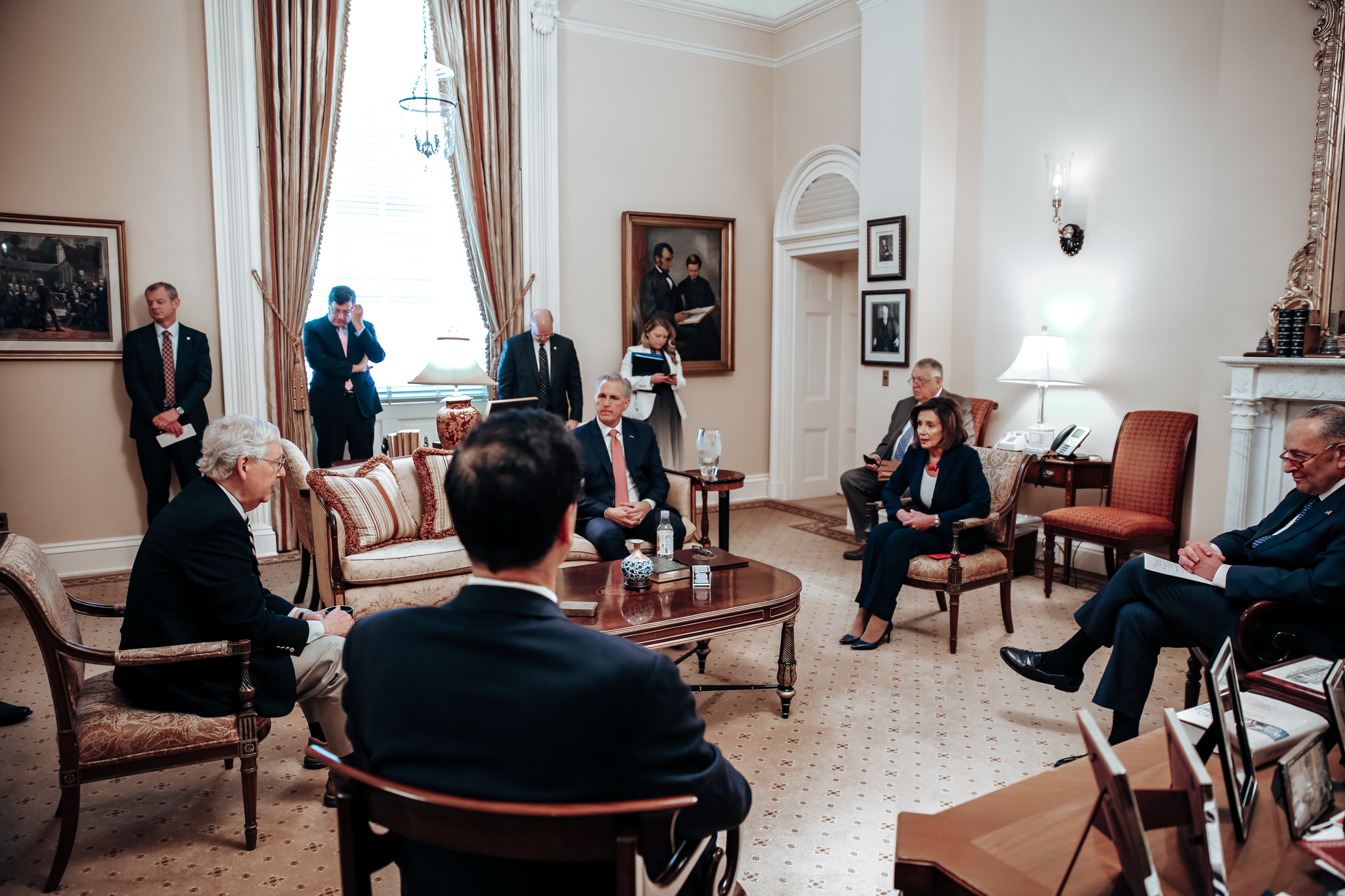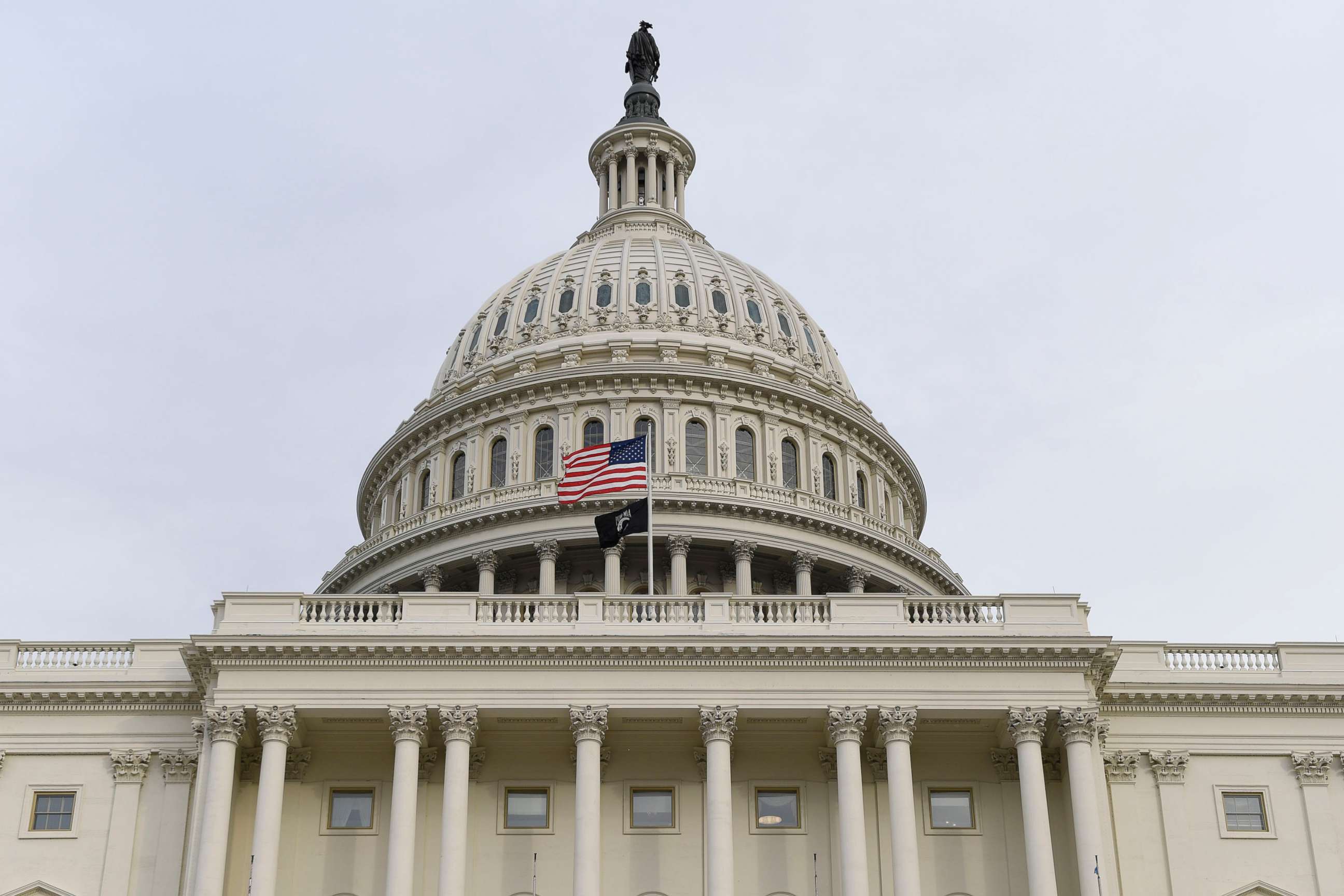Bipartisan coronavirus stimulus talks break down
House Speaker Pelosi said Sunday, "We are so far apart."
Bipartisan talks on a third economic stimulus package to address the novel coronavirus crisis -- worth well over $1 trillion -- have run aground, leaving the outcome uncertain, and it appears all but certain that both chambers will not have a bill to send to the president's desk by Monday.
House Speaker Nancy Pelosi sounded an ominous note, speaking to a staffer after she left a closed door meeting with top congressional leaders and Treasury Secretary Steven Mnuchin, saying, "We are so far apart."
When asked why just moments later, she said, "We are still talking. It's on the Senate side now, because that's their deadline for a vote. But we'll be introducing our own bill, and hopefully it'll; be compatible with what they discussed in the Senate."
Tune into ABC at 1 p.m. ET and ABC News Live at 4 p.m. ET every weekday for special coverage of the novel coronavirus with the full ABC News team, including the latest news, context and analysis.
The hope among Senate leaders and the administration was to craft a bill -- the same bill -- to pass in both chambers by Monday, an attempt to send a strong, calming signal to the markets.
Ignoring the apparent disagreement, Mnuchin exited the leadership meeting saying, "We just had a productive meeting with the speaker and we still think we have an overall understanding. And we're going to try to get this on paper."

The Senate's Republican leader, Mitch McConnell, echoed that sentiment moments later in a press conference.
"I think it's safe to say we're very close," said McConnell, adding emphatically, "But make no mistake about it, we'll be voting tomorrow. I mean the wheel has to stop at some point."
When pressed about the Pelosi disagreement, McConnell said, "What we intend to do here in the Senate is to move forward with a Senate bill. I'm hopeful and optimistic we'll get bipartisan support because this bill has been negotiated on a bipartisan basis here in the Senate."
"Now we're at a point in the discussion where people will shortly have to say yes or no. And I'm confident given a desire of the country to see an outcome that we'll get to yes," McConnell added.
One change that has been agreed to on a bipartisan basis was the elimination of a phase-in for those $1,200 checks to Americans, a provision pushed by Sen. Josh Hawley, R-Mo. But there will no longer be a second tranche of checks going out in May, unless the administration returns to Congress to fight that fight.
Democratic aides on Sunday indicated a host of problems with the bill as negotiated so far, a bill that has had Senate Democratic input since Friday.
Under the $350 billion in aid to small businesses, which has broad support, if the loan is used for payroll and interest on leases, for example, to keep the business open -- that money will be converted into a grant. The legislation would make it retroactive to March 1, 2020. But Democrats had hoped to add language that would incentivize businesses to hire back employees laid off by the pandemic by making the loan forgiveness contingent on rehiring.
Republicans, however, say that some businesses might not be able to hire back employees, in particular not right away.
"It might have the reverse effect," said one GOP aide familiar with the matter.
A senior Democratic aide sent out a laundry list of items Democrats oppose, including an item the aide labeled the "McConnell Corporate Slush Fund."
The $500 billion corporate fund would be a mix of loans and guarantees to be established by the Treasury Department, but Democrats fear it would become a "slush fund" for GOP priorities.
Marathon, round-the-clock talks started late last week and ran through the weekend. Up until Sunday, it seemed both sides were moving swiftly toward a deal. The mood changed substantially Sunday ahead of the leadership meeting.

A key test vote was set for Sunday night in the Senate, pushed back three hours by the Majority leader to buy more time for negotiators. McConnell needs 60 votes to keep the stimulus bill moving toward final passage, and in the narrowly-divided chamber, McConnell will need a substantial number of Democrats to sign on, particularly with one GOP senator, Rand Paul of Kentucky, testing positive for COVID-19 and potentially two other Republicans -- Rick Scott of Florida and Colorado's Corey Gardner -- still under self-quarantine and unable to vote.
Democrats' list of concerns signaled that a bipartisan deal that could pass the Democratically-controlled House might be far away.
The list included what Democrats said were a lack of transparency in lending proposals that give the Treasury Secretary the ability to keep loans private for up to six months, "no specific provisions to protect individuals from eviction, foreclosure or forbearance," a senior Democratic aide said.
A senior Democratic aide said other major problems include:
What to know about coronavirus:
- How it started and how to protect yourself: coronavirus explained
- What to do if you have symptoms: coronavirus symptoms
- Tracking the spread in the US and Worldwide: coronavirus map
This report was featured in the Monday, March 23, 2020, episode of “Start Here,” ABC News’ daily news podcast.
"Start Here" offers a straightforward look at the day's top stories in 20 minutes. Listen for free every weekday on Apple Podcasts, Google Podcasts, Spotify, the ABC News app or wherever you get your podcasts.




